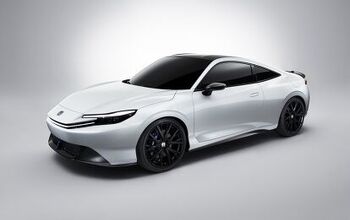Daily Podcast: CAFE Culture
The list of CAFE violators ( in PDF form) reads like a valet’s to-do list: Mercedes, Porsche, Ferrari, Maserati. These firms pay CAFE fines because, well, they can. CAFE fines are calculated by multiplying each tenth of a mile per gallon of average non-compliance by $5.50, then multiplying that dollar amount by the number of vehicles sold. As a result, luxury firms pay the highest fines when they try to go mass market: Merecedes paid about $30 million for 2007. But if CAFE is already weighted to let small companies off the hook, why are we hearing about new rules which seem to relax standards for firms selling fewer than 400k vehicles per term? Aren’t the regular loopholes enough?
The answer takes a little digging to find, but it explains everything. Proposed rules for the 2011-2015 standard ( PDF) reveal that
EPCA authorizes increasing the civil penalty up to $10.00, exclusive of inflationary adjustments, if NHTSA decides that the increase in the penalty—
(i) will result in, or substantially further, substantial energy
Doubling the CAFE fine would force the small firms to finally get serious about efficiency . . . unless there were a loophole. Hence the loophole.
Of course, that’s not going to be enough come the day when greenhouse gasses become a regulated pollutant under the Clean Air Act. As proposed rules for CAFE/GHG coordination explain:
failure to meet the standards after credit opportunities are exhausted would ultimately result in the potential for penalties under [Energy Policy and Conservation Act] (CAFE), and under the [Clean Air Act] as well. The CAA allows considerable discretion in assessment of penalties. Penalties under the CAA are typically determined on a vehicle-specific basis by determining the number of a manufacturer’s highest emitting vehicles that caused the fleet average standard violation. This is the same mechanism used for EPA’s National LEV and Tier 2 corporate average standards, and to date there have been no instances of noncompliance.
In short, fines are going to double, and the risk of a Clean Air Act violation lawsuit means non-compliant firms face double jeopardy.
More by Edward Niedermeyer
Latest Car Reviews
Read moreLatest Product Reviews
Read moreRecent Comments
- Formula m For the gas versions I like the Honda CRV. Haven’t driven the hybrids yet.
- SCE to AUX All that lift makes for an easy rollover of your $70k truck.
- SCE to AUX My son cross-shopped the RAV4 and Model Y, then bought the Y. To their surprise, they hated the RAV4.
- SCE to AUX I'm already driving the cheap EV (19 Ioniq EV).$30k MSRP in late 2018, $23k after subsidy at lease (no tax hassle)$549/year insurance$40 in electricity to drive 1000 miles/month66k miles, no range lossAffordable 16" tiresVirtually no maintenance expensesHyundai (for example) has dramatically cut prices on their EVs, so you can get a 361-mile Ioniq 6 in the high 30s right now.But ask me if I'd go to the Subaru brand if one was affordable, and the answer is no.
- David Murilee Martin, These Toyota Vans were absolute garbage. As the labor even basic service cost 400% as much as servicing a VW Vanagon or American minivan. A skilled Toyota tech would take about 2.5 hours just to change the air cleaner. Also they also broke often, as they overheated and warped the engine and boiled the automatic transmission...


































Comments
Join the conversation
Like we've said before, this an exceptionally complex way of getting the same thing you can get out of a simple gas tax.
Correct, dean, and under this law the bureaucracy has the "discretion" to be judge, jury and executioner.